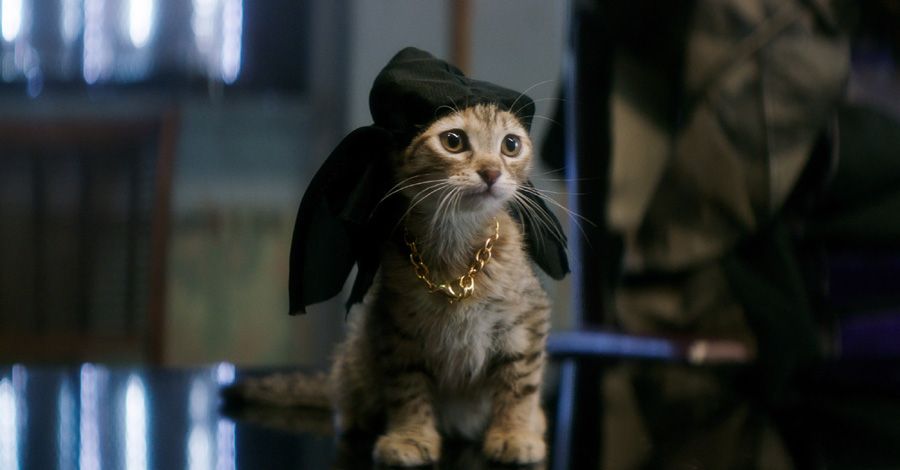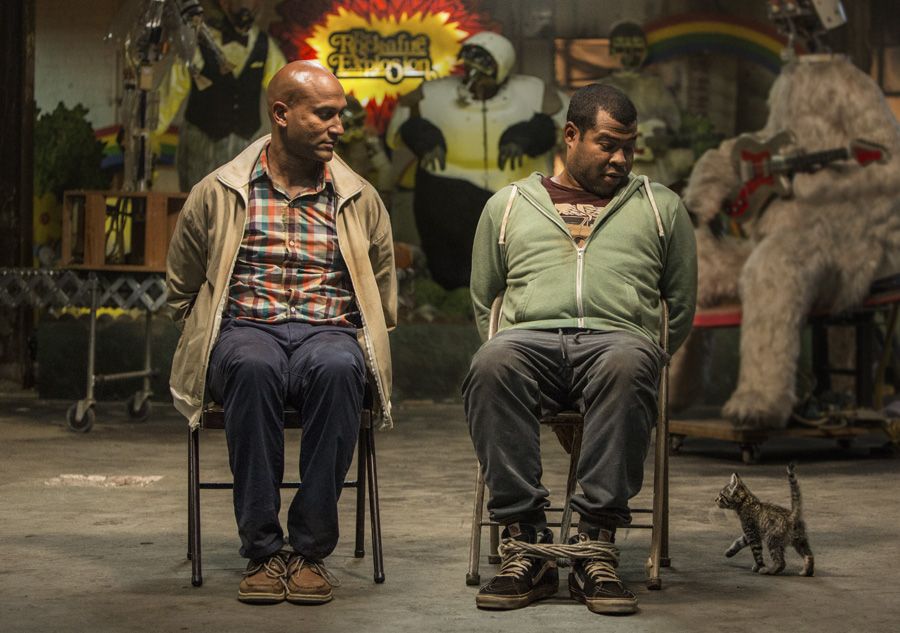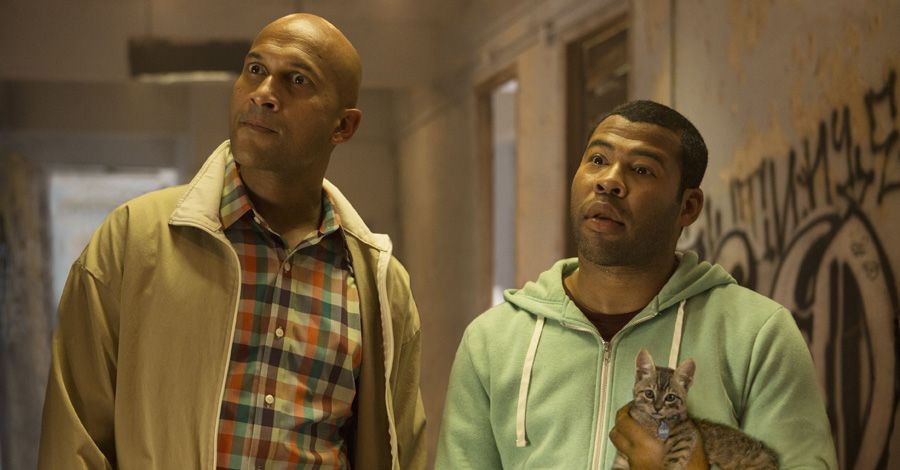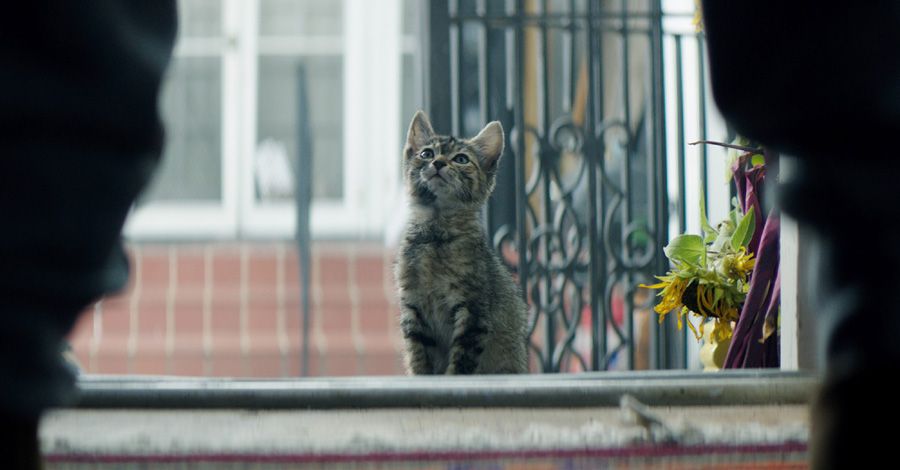After conquering television with their acclaimed sketch-comedy show “Key & Peele,” Keegan-Michael Key and Jordan Peele are looking to triumph at the box office with their first feature. For extra insurance, they’ve added the world’s most adorable kitten into the mix.
“Keanu” casts the comedy duo as Rell (Peele), a cannabis aficionado reeling from a broken heart, and his cousin Clarence (Key), a tightly wound people-pleaser who’s been ordered by his wife to have an adventurous weekend while she’s away. However, that adventure turns instantly intense, and hilarious, when cuddly stray kitten Keanu – the only thing holding together emotionally fragile Rell -- vanishes when Rell’s apartment is mysteriously ransacked. With that, the cousins set out on a Liam Neeson-style rescue mission into the most dangerous corners of Los Angeles.
Ahead of the film’s Friday premiere, Key and Peel joined SPINOFF for a wide-ranging conversation about its film’s late-‘80s/early-‘90s action-comedy influences, the iconic comedy partnerships they admire, and when firearm instruction goes wrong.
Spinoff Online: Thank you for taking on the puppy-archy and proving that a cat can also headline a film. A win for diversity.
Keegan-Michael Key: That’s right, that’s right. Exactly, yeah.
Jordan Peele: Hopefully we can get a cat nominated this year.
I loved learning that the kitten came well into the process of putting this story together. So tell me where you guys were when you had that lightbulb over your head – like, “Let’s throw in this kitten at the center of everything.”
Peele: The script was focused a little bit more on Clarence’s journey: this idea of a guy who has one weekend to toughen up and to find his sort of man’s adventure, as dictated by his wife -- me being sort of his bad-influence cousin who was helping him along this journey. There was something that was missing. There was a piece of heart that was missing from the story. There was a piece of why these guys would put themselves into this danger.
So Keanu came along and just answered all of those problems. It gave us a reason why we’re going to be risking our lives at all. Everyone can see, “Yeah, I’d probably go save that kitten,” especially if that’s a member of your family. I’d save my pet. And it also gave my character, of course, this real stake in the journey as well. So now it became a buddy comedy.
You and your director Peter Atencio are already a pretty well-oiled machine from working on your Comedy Central show. What were the daunting aspects of going big with a feature and taking what you do and doing a full narrative? And what were the thrilling parts of it for you guys?
Key: I think more the daunting aspects were actually almost environmental. The fact that we were shooting in New Orleans in the summer was a big thing. But also, the hours – though the hours were long on the show, somehow they felt longer on the movie, and I think mostly was because of night shoots. So you have a battery of days that would go together where you felt like a vampire. It was a perfect place to be a vampire, New Orleans. Because you’d get home at seven in the morning and kind of sleep until 2pm and go back and hit it again.
So there were lots of, it’s a matter of going, you can’t get too frivolous and you have to take your vitamins, that kind of stuff so we keep ourselves intact for the job at hand. The thing that’s been wonderful is that we do, we have this short hand with each, the three of us, Peter and Jordan and me. I think for me personally, for Keegan personally, it was thrilling for me to be able to go into the trailer every day and see the same wardrobe. To get to play the same character every single day
Even in that khaki windbreaker? Which I think I own, by the way.
Key: Even that windbreaker! But there was a sense of, the windbreaker certainly had some situations environmentally because I’m like, “Why did we pick this for the wardrobe? It’s 106 out here!” There was that sense of, there’s going to be a continuity. There’s a different challenge where every single day, where is Clarence today emotionally?
We’d have little pow wows, Jordan and I, when we’d say, “OK, so we just came from here, we’re turning the corner into this room, we would be feeling like this, and then executing that …” To me, that was a thrill. It’s the challenge of saying, “Can I jump right to a six on the emotional scale at 7:15 in the morning?” So that’s the challenge for me. It’s different than doing a play, in a manner of speaking.
I love the code-switching that is a part of your work in general, and that it’s such a foundation here. Tell me what intrigued you about the way you approached it in this movie.
Peele: I think this movie is an homage to all of our favorite movies, our favorite type of action movie: “New Jack City,” the “Point Breaks,” “Raising Arizona,” “True Romance.”
Key: “Tango & Cash,” “Tequila Sunrise.”
Peele: I think there’s this feeling like, we’d never seen guys like us in a high-stakes action movie, specifically African-Americans who are like … we avoid conflict. We’re nerds. We like watching TV, movies. There’s not a whole lot of badass in there, except for this desire to be badass.
So a big part of this movie was, we get to make a movie, we get to do whatever we want, so let’s put ourselves in these high-stakes action movies that are often abound with stereotypes and the more macho gangsta depiction of African-Americans in this films. How would we survive if we had to enter New Jack City to save something precious to us?
Key: It’s a film thing. It’s a comment on us being able to have a movie. Something that Jordan said recently in an interview that I thought was interesting: If you could go back to “Die Hard,” and you see Clarence Gilyard’s character, I think it’s Clarence Gilyard, yeah, who plays the techie, right?
Peele: That’s as close to us as anything…
Key: When is that character ever going to get to be the lead in a movie? The Clarence Gilyard character in “Die Hard.”
Peele: “‘Twas the night before Christmas and all through the house …”
Key: Right, right, exactly. Adjust my glance.
Peele: “Not a creature was stirring, except for the three motherfuckers coming up in the back ...”
How easily did the badass stuff come to you? The gun play. And did either of you try the actual flip off the way we see in the film, or was that movie magic?
Peele: Did we ever do an actual flip? Did anybody?
Key: No, we never did. In fact, well, your stunt guy did a flip. Your stunt guy did a flip, but my stunt guy actually was rigged. When you see the first flip, that’s my stunt guy. He did a rig, and I was just like, “Wait a minute – I could have done that!” Not that I could have, necessarily – I just think I could because they make it look so easy.
Peele: To save time, we didn’t have a lot of time to shoot, so we didn’t actually do any of the flips.
Key: We did all of our gun play. We got to go to a range, shooting range. I got to shoot an uzi, which wasn’t even in the film, so that was cool. And talk about code-switching! It wasn’t even racial code-switching, but it was life imitating art, because there was this badassery situation, where you’re just kind of like, “Yeah, no, I haven’t used this one in particular. Show me how to rack that gun.” OK, and you’re like, “Yeah.” And you hand the gun over and you're hand’s still shaking. You’re just going, “No, I’m used to this six-hour.” But I only say that after he says it. “So guys, it’s going to be a Glock. That’s a six-hour” … ”I’ll take the six-hour 420!” Like I know what that is.
Peele: At one point somebody gave me a gun that just fell apart in my hands. Do you remember that?
Key: That’s right. It just like, it was like a MAC-11 or something. The pieces fell off.
Peele: You don’t want to hear the guy that’s supposed to be the arms expert going like, “Oh, that’s probably not supposed to happen.” Probably?
Key: Probably. Even I can tell you that.
When you thought about translating your comedy partnership to film, who are the iconic comedy teams that you look to for inspiration? Are there favorites of yours that you were like, “These guys knew how to do it together on the big screen”?
Peele: We talk about [Richard] Pryor and [Gene] Wilder.
Key: Pryor and Wilder, big-time. Certainly on the big screen.
Peele: Yeah, right. The whole, “We bad, we bad.” That has that intrinsic quality to it.
Key: Steve Martin and Michael Caine – which, they never did another movie together, but “Dirty Rotten Scoundrels,” the story and the plot of it was so well put together.
Peele: It was this feeling like every scene was not only a comedic scene unto itself, but one that could only exist if you know the movie coming up to that point. “Dirty Rotten Scoundrels” is actually a very big influence in how to move from sketch to film. Every scene can have its own comedic engine, but you can’t separate it from the rest of the movie.
Key: Right. So it’s a weird thing to say, but what you're doing is, the plot should be simple enough that you can put important things in the story, but the plot should be simple and direct enough that it’s open enough to fill it with other good things.
“Dirty Rotten Scoundrels,” you know exactly what the plot of the movie is, and the same thing with “Keanu.” It’s just, “A cat gets stolen. We’ve got to save the cat.” That’s it. That’s it. Then, you can shove anything else you want in there, as long as we all connect and understand clearly what the plot is.
You both have multiple projects kind of percolating together and separately, but the “Police Academy” reboot really intrigues me. What do you love about the original that you want to capture, and how do you want to bring it up to date?
Peele: Well, we love the way that “Police Academy” is something that lends itself to our sketch experience. It really did have these great set pieces. It was kind of like a sketch movie in that, unlike “Keanu,” it’s like if you take any scene out of that movie, it stands alone. So really, we want to, I think the goal is to take the style of humor, but then also update it with the new technology, the new social issues surrounding our relationship to the police and what that means: tactics, things like badge cams.
We talk about the movie having a tone that’s kind of like “End of Watch” or “Training Day.” So it’s grittier, it’s more real. And the question for me is always like, if the plot of “Police Academy” took place in real life – and the plot of “Police Academy,” of course, is a bunch of … the mayor decides anybody can be a cop. If you previously weren’t able to apply for the police academy for whatever reason, that’s gone. So now any ragtag group can come and do that. So I like that premise. So let’s see in real life how it would that play out.
Who’s doing the Michael Winslow noises?
Peele: Hopefully Michael Winslow!
Key: Michael Winslow, yeah. Maybe Reggie Watts.
Peele: Maybe Reggie Watts.




